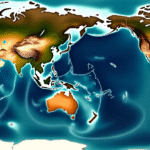Introduction to Marilia Aisenstein’s Concerns
I stumbled upon an article by Marilia Aisenstein, a psychoanalyst titled “Desire, Pain, and Thought,” which revisited a 2004 conference where she expressed her worry about the destruction of thought. At that time, her concerns revolved around two significant issues: how our societies, both individually and collectively, were embracing new global orders focused on consumption, acceleration, and accumulation, and how these imperatives were degrading human relationships.
The Structural Conditions of Our Time
These processes, undoubtedly, are structural conditions of our era. However, they also propose laws of coexistence and belief that humans consciously or unconsciously adopt, without considering the possibility of questioning and doubt. As a result, our social relationships follow an obligation stemming from a reactive imperative, where obedience to immediate demands, neglecting critical reflection on personal, social, and historical relationships, has become constitutive in our lives. This transformation renders us functional pieces of seemingly democratic projects that now carry an authoritarian scent.
Examples of Destructive Imperatives
To illustrate this, one need only look at the United States’ fear-based policies against anything different, economic belief systems like “In God We Trust,” the annihilation of life in El Salvador on those bodies deemed unfit for civilization’s models, and the conflict between Gaza and Israel, which has led to a life annihilation through profound dehumanization.
Civilizational Pacts and Their Consequences
Our current times are governed by civilizational pacts we have built and strengthened. The issue lies in these cultural agreements dictating our relationships with the world and amongst ourselves, causing more destruction, aggression, and human/environmental devastation as obedience to market logic and consumption increases.
Aisenstein’s Warning
As Aisenstein notes, “When the notion of civilization is constrained by human beings, it can lead to a dangerous artistic ideal or ideology” (p.107). This is an era where the goal is to destroy thought and strengthen social disconnection. The lack of thinking and the unbearable distress caused by fear and uncertainty dictate our survival methods, regardless of how these rules and ways of life work by destroying our inner selves—emotional, subjective, and temporal—and contribute to our own destruction and that of the things surrounding us.
Ethical Responsibility and Social Disconnection
We have accepted our ethical responsibility towards pain and substituted it with immediate actions, ideologies, and beliefs. The significance of social losses drives us to write, erasing all traces of past events and their suffering.
Consequences of Social Disconnection
When there is social disconnection, the meaning of our history is destroyed, loss is exiled, and any logic of sense that could enable questioning about what happened and what is happening to us is deprived.
Des-mentalization and the Call for Critical Thinking
Today, we experience a process of desmentalization where a dialectic driven by the stronger party and a community surrendering its capacity to think leads to listening and formulating new, unique proposals where individualities can be heard and thought through their differences. As Michel de Certeau emphasized in his 1999 work “The Culture of Plurality,” we should value the power of thinking, enabling societies to create subaltern cultures resisting impositions and confronting any form of domination through imagination and creativity.
Key Questions and Answers
- What are the concerns raised by Marilia Aisenstein? Aisenstein worries about the destruction of thought and the strengthening of social disconnection in our time.
- How do the structural conditions of our era contribute to this issue? These conditions, driven by global orders focused on consumption, acceleration, and accumulation, degrade human relationships and promote destructive imperatives.
- What examples does Aisenstein provide to illustrate these destructive imperatives? Examples include the United States’ fear-based policies, economic belief systems like “In God We Trust,” and the dehumanization in conflicts such as Gaza and Israel.
- How do civilizational pacts affect our relationships and the environment? These pacts dictate our relationships with the world, causing more destruction, aggression, and human/environmental devastation as obedience to market logic and consumption increases.
- What is the significance of ethical responsibility and social disconnection in this context? Accepting ethical responsibility towards pain and substituting it with immediate actions, ideologies, and beliefs erases traces of past events and their suffering.
- What is the current process we are experiencing, and what is the call for action? We are experiencing desmentalization, where critical thinking and resistance through imagination and creativity are essential to create subaltern cultures and confront domination.






